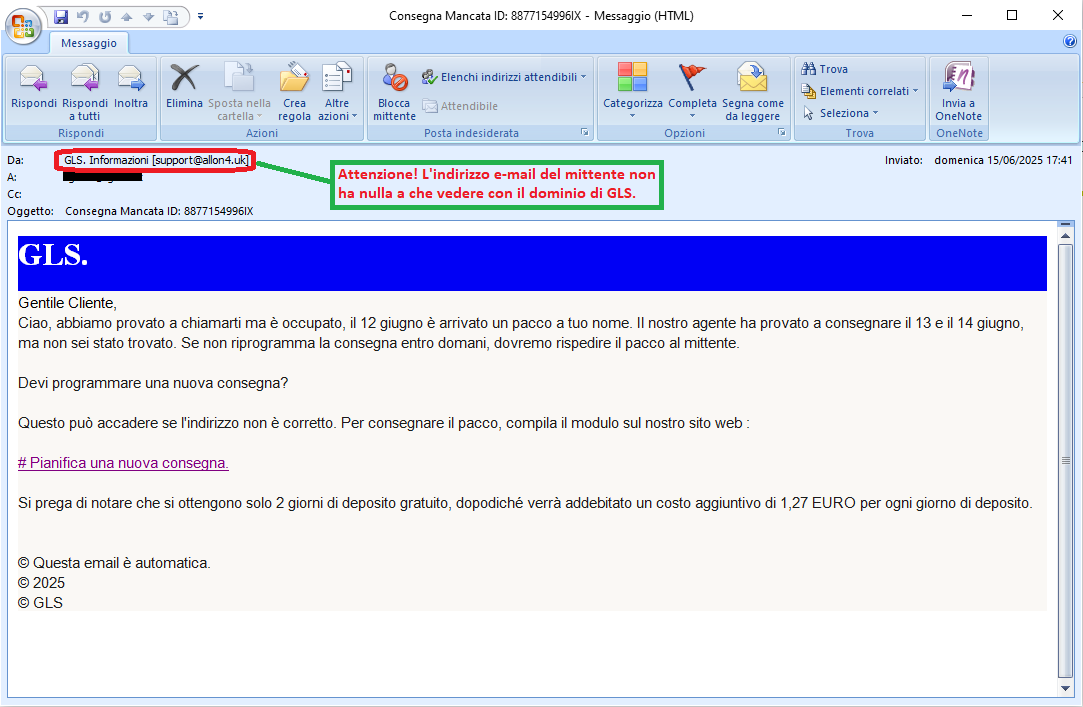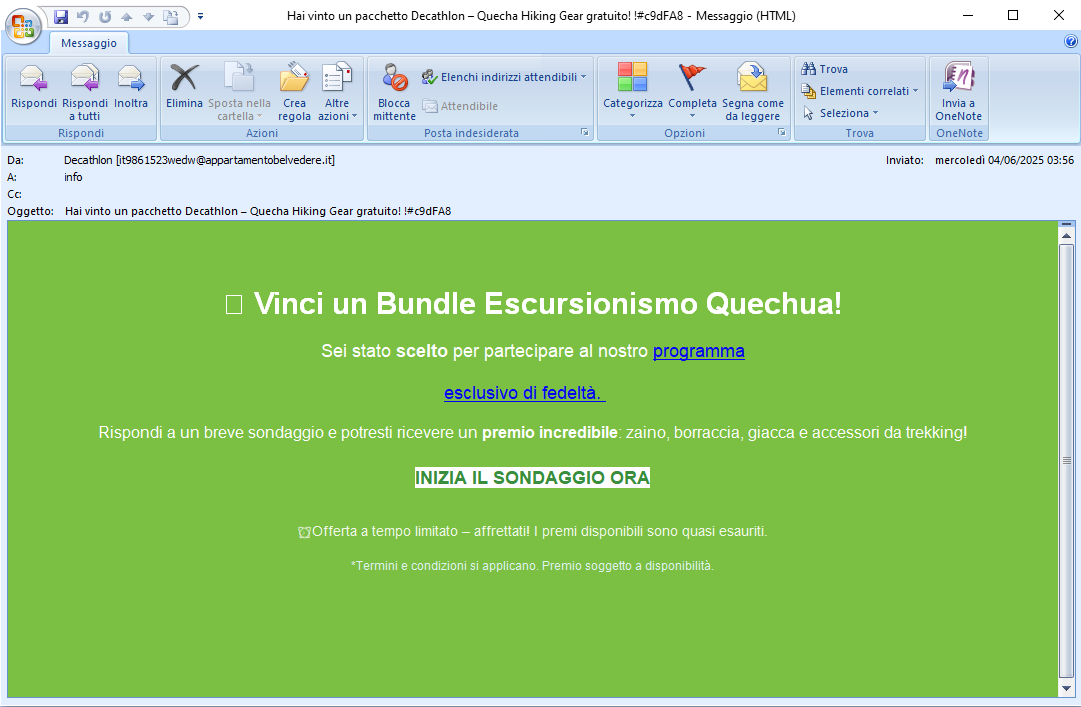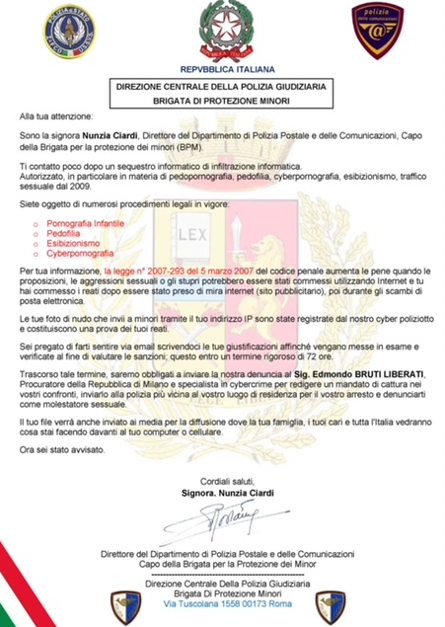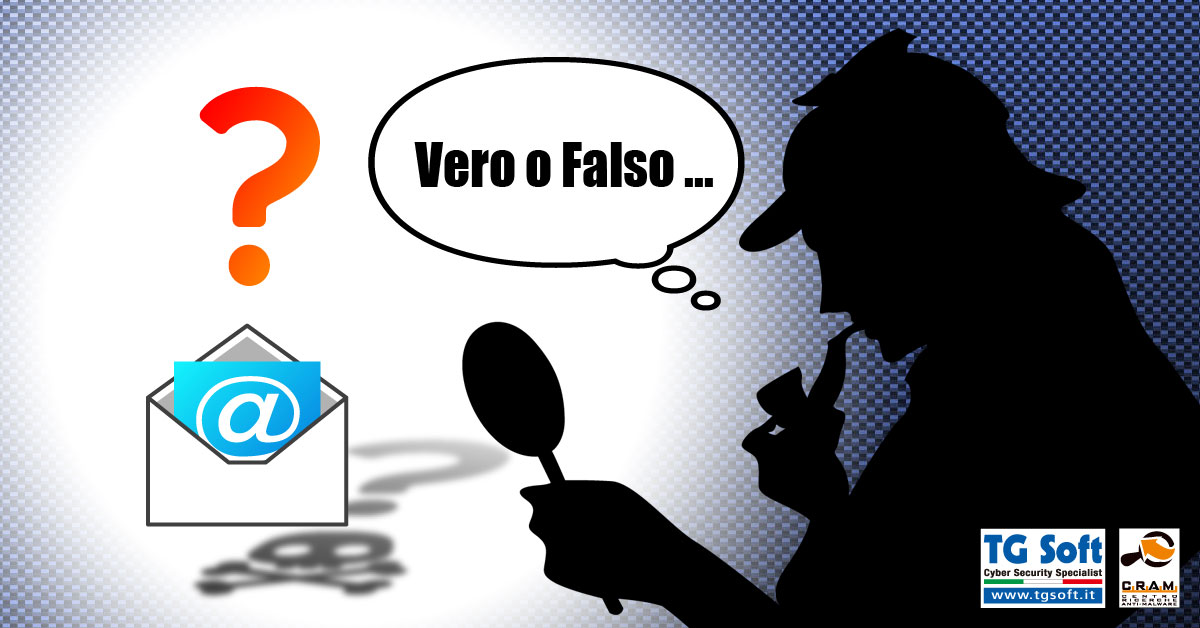We analyze below the phishing attempt that aims to steal the account credentials of
.
The message, in English, informs the recipient that he/she has received 1 file and has up to 7 days to consult and download it, and afterwards it will be removed from the servers. It then invites him/her to log in to download the file, via the following link:
When we analyze the email we immediately notice an inconsistency in the information, in fact in the subject line of the email the available file is an invoice, while in the body of the message the details of an alleged quote <
> are given. Furthermore, the email address <
. This is definitely anomalous and should, at the very least, make us suspicious.
link, will be sent to an abnormal, graphically well laid out WEB page where he or she is prompted to log in to his or her
account to download the file listed in the message. In this case an invoice is shown.
brand.
The message informs the recipient that the automatic payment for the renewal of his/her domain hosted on
, has failed. It then invites him/her to complete the renewal to avoid the permanent deletion of his/her account. To renew, it seems necessary to click on the following link:
Clearly, the well-known web hosting, e-mail and domain registration services company
is unrelated to the mass sending of these e-mails, which are real scams whose goal remains, as always, to steal sensitive data of the unsuspecting recipient.
When we analyze the message, we notice right away that the sender's e-mail address <
.
Anyone who unluckily clicks on the link will be diverted to the displayed page.
On this page, the user is prompted to access his or her client area with login and password to renew his or her domain and thus avoid the account block.
Although the site may be misleading because of the presence of the well-known logo of
, we see that the broswer's url address is anomalous and not traceable to the company's official domain:
If uou enter our data into counterfeit websites, actually, it will be delivered to the cyber-criminals behind the scam who will use it for criminal purposes. We therefore urge you not to rush and always pay attention to every detail, even trivial ones.
The message informs the recipient that his/her e-mail has expired on the date of the e-mail and has been deactivated. It is therefore no longer possible to send or receive messages until it is reactivated. The e-mail also warns the user that one day after the expiry date, all messages will be deleted.
The user is then invited to reactivate his account as soon as possible via the following link:
If we look closely at the message, there are some suspicious clues. First of all, the e-mail address <
, a highly anomalous fact. Another red flag is the request to enter the user's account credentials via a link provided by e-mail.
We analyze this month the following phishing attempt pretending to be a communication from
, the well-known payments system serving public administrations and utilities in Italy.
The message warns the recipient of a late payment for a traffic violation, including reference number <
> and the reason for the violation: <speeding>.
It then shows the amount of the unpaid fine, i.e.
. The recipient is subsequently invited to pay within 72 hours in order to avoid surcharges, otherwise the amount will be increased to €396.00, in addition to the deduction of 6 points from the driving licence. Finally, it provides the link for the payment:
Clearly, the well-known digital payment platform is uninvolved in the mass sending of these e-mails, which are real scams whose goal remains, as always, to steal the sensitive data of the unsuspecting recipient.
If we analyse the message carefully, there are some suspicious clues. We immediately notice that its email address <
.This fact is definitely abnormal, and should make us suspicious.
link, will be directed to a web page which, as we can see from the image on the side, is graphically well designed and simulates the official site of
quite well.
which is unrelated to the official site of the company.
We always urge you to pay attention to even the smallest details and not to enter your personal and/or credit card information on forms hosted on counterfeit web pages, as it will be sent to a remote server and used by cyber crooks.
We analyse below a new data theft attempt coming via a message allegedly from the well-known
courier.
The message, which we reproduce on the side, warns the recipient to reschedule a delivery, as an unsuccessful delivery attempt was made on June 21, and an unsuccessful phone contact was tried on June 23 to reschedule the delivery. To unblock the delivery, it seems necessary to confirm the shipment details and reschedule the delivery through the following link:
# Access delivery information verification
Two days are given to reschedule the delivery, without paying the deposit for the stationary package. Beyond that time, the storage fee will be Euro 1.27 for each day of storage.
The message, although supposedly from the
GLS courier, is very poor and lacks any identifying information about the delivery. Only an ID is given (ID 50014201369) that is easily discredited by checking the tracking on the
GLS official site.
We also observe how the email address it came from <
support[at]allon4[dot]uk> cannot be traced back to the official domain of
GLS. This fact is definitely anomalous and should, at the very least, make us suspicious.
Clearly
GLS is unrelated to the mass mailing of these malicious campaigns, which are outright scams whose goal remains, as always, to steal sensitive data of the unsuspecting recipient.
Anyone who unluckily clicks on the
# Access delivery information verification link, will be directed to a web page that is supposed to simulate the official website of
GLS, but which has already been reported as DECEPTIVE WEBSITE/PAGE. In fact it is run by cyber-criminals whose goal is to get hold of your most valuable data in order to use it for illegal purposes.
We always urge you to pay attention to even the smallest details and not to enter your personal and/or credit card information on forms hosted on counterfeit web pages, as it will be sent to a remote server and used by cyber crooks.
17 June 2025 ==> Phishing Mailbox
SUBJECT: <
Mailbox Account Password Expiry Notice | JUNE 17, 2025>
The short message, in English, informs the recipient that his/her mailbox password will expire soon. It therefore invites him/her to update his/her password in order not to lose it, through the following link:
Keep Same Password
The well-known company, is clearly unrelated to the mass sending of these emails, which are real scams whose goal remains, as always, to steal the sensitive data of the unsuspecting recipient.
If we analyze the message carefully, it contains some suspicious clues. In fact, first of all, the email address <
sales[at]copely[dot].com> cannot be traced back to the official domain of Mailbox. This fact is definitely anomalous and should, at the very least, make us suspicious. It also seems strange that the user is asked to enter his/her credentials to update his/her account via a link provided via email.
Anyone who unluckily clicks on the
Keep Same Password link, will be directed to an anomalous web page which has already been reported as DECEPTIVE WEBSITE/PAGE. In fact it is run by cyber-criminals whose goal is to get hold of your most valuable data in order to use it for illegal purposes.
We always urge you to pay attention to even the smallest details and not to enter your personal data and/or passwords on forms hosted on counterfeit web pages, as they will be sent to a remote server and used by cyber criminals.
15 June 2025 ==> Phishing GLS
SUBJECT: <
Delivery Failure ID: 8877154996IX>
We analyse below a new data theft attempt coming via a message allegedly from the well-known
GLS courier.

The message, which we quote on the side, refers to a parcel awaiting delivery. It informs that two unsuccessful delivery attempts have already been madel, and that it is necessary to reschedule the delivery by tomorrow. In addition, a charge of EUR 1.27 per day will be made for each additional day of storage. The recipient is then invited to fill in the form directly from their website, via this link:
#Schedule a new delivery
The message, although allegedly from the
GLS courier, is very poor and lacking in information to identify the delivery.
Clearly,
GLS is uninvolved in the mass mailing of these malicious campaigns, which are real scams whose goal remains, as always, to steal sensitive data of the unsuspecting recipient.
So keep your eyes open... all it takes is a little attention and a quick glance to avoid unpleasant incidents.
Anyone who unluckily clicks on the #Schedule a new delivery
link, will be directed to a webpage that should simulate the official site of GLS, but which has already been reported as DECEPTIVE WEBSITE/PAGE. In fact it is run by cyber-criminals whose goal is to get hold of your most valuable data in order to use it for illegal purposes.
We always urge you to pay attention to even the smallest details and not to enter your personal data and/or passwords on forms hosted on counterfeit web pages, as they will be sent to a remote server and used by cyber criminals.
12 June 2025 ==> Phishing SumUp
SUBJECT: <I m p o r t a n t: S e c u r i t y u p d a t e f o r y o u r S u m U p a c c o u n t>
We find again this month the phishing attempt pretending to be a communication from
SumUp, the London-based digital payments company.
The message requests the recipient to update his/her account data following a security update. It then informs him/her that if he/she does not update, he/she may permanently lose access to the account until the data is updated. The following button is indicated to proceed:
Update Data
The well-known company, is clearly unrelated to the mass sending of these emails, which are real scams whose goal remains, as always, to steal the sensitive data of the unsuspecting recipient.
If we analyze the message carefully, it contains some suspicious clues. In fact, first of all, the email address <
emaa[at]idealprestiti[dot]it> cannot be traced back to the official domain of
SumUp.
This fact is definitely unusual and should raise our suspicions. Another strange thing is that to perform the update, the user is asked to enter his/her account credentials through a link sent via email.
Anyone who unluckily clicks on the
Update Data link, will be directed to a web page which, as we can see from the picture on the side, is graphically well done and simulates quite well the official website of
SumUp.
We can see, however, that the landing page in this case is hosted on the url address:
https[:]//[FakeDomainName*]sumup1/ which is unrelated to the official site of the company.
We always urge you to pay attention to even the smallest details and not to enter your personal data and/or passwords on forms hosted on counterfeit web pages, as they will be sent to a remote server and used by cyber criminals.
12 June 2025 ==> Phishing Aruba - Unsent messages
SUBJECT: <
Important notice: you have (2) unsent messages>
Phishing attempts pretending to be communications from the
Aruba brand continue.
The message informs the recipient that as of June 12th, two new messages have arrived but were not delivered to the mailbox hosted on Aruba. The reason for the delivery failure seems to be a new incoming mail management policy adopted by Aruba. It therefore invites the user to retrieve the suspended message through the following link:
Click here to retrieve the message
Let 's always beware of requests to enter personal credentials via suspicious links provided by e-mail.
Clearly, the well-known web hosting, e-mail and domain registration services company
Aruba, is uninvolved in the mass sending of these e-mails, which are real scams whose goal remains, as always, to steal the unsuspecting recipient's sensitive data.
When we analyse the message we see that it comes from an email address <i
nfo(at)assovini(dot)it> not traceable to the official domain of
Aruba.This is definitely anomalous and should, at the very least, make us suspicious.
Anyone who unluckily clicks on the link, will be directed to an anomalous web page which has already been reported as DECEPTIVE WEBSITE/PAGE. In fact it is run by cyber-criminals whose goal is to get hold of your most valuable data in order to use it for illegal purposes.
11 June 2025 ==> Phishing EuroPages
«SUBJECT:<Heinrich Bauer sent you a request concerning your product on europages>
This month, we find the following phishing attempt consisting of a false communication from
EuroPages and aimed at stealing the victim's account credentials.
The message alerts the user of a message received concerning his/her product on
EuroPages, from a certain “Heinrich Bauer”. It then invites the user to log in to his/her account to view the message, via the following link:
LOGIN TO MY ACCOUNT
When we analyse the message, we see that it comes from an email address <
info(at)termoidraulicamartone(dot)com> not traceable to the official domain of
EuroPages. This is definitely abnormal and should, at least, raise our suspicions.
Anyone who unluckily clicks on the
LOGIN TO MY ACCOUNT link, will be directed to an anomalous web page which has already been reported as DECEPTIVE WEBSITE/PAGE. In fact it is run by cyber-criminals whose goal is to get hold of your most valuable data in order to use it for illegal purposes.
04 June 2025 ==> Phishing GoDaddy
SUBJECT: <
GoDaddy Billing Issue – Please Update Your Payment Method>
We analyse below the phishing attempt pretending to be a communication from
GoDaddy, a US company that provides hosting and Internet domain registration.
The message, in English, informs the recipient that it was not possible to complete the renewal of GoDaddy services due to the current payment method provided. To avoid service suspension, it seems necessary to promptly update the payment information.
It then invites the user to update his/her payment method through the following link:
Update Payment
Clearly, the well-known web hosting, e-mail and domain registration service company,
GoDaddy, is uninvolved in the mass sending of these e-mails, which are real scams whose goal remains, as always, to steal sensitive data of the unsuspecting recipient.
When we analyse the message, we immediately see that the sender's e-mail address <
support[at]alizadetajhiz[dot]com> is not from the official domain of
GoDaddy.
Anyone who unluckily clicks on the
Update Payment link, will be directed to the displayed page.
As we can see, firstly, the landing page is well-designed and reasonably mimics the official
GoDaddy website
We can see that the landing page in this case is hosted on the url address:
https[:]//[FakeDomainName*]godaddyes/assets/ which is unrelated to the company's official website.
We therefore urge you not to rush and always pay attention to every detail, even trivial ones.
If you proceed to enter the requested data, specifically credit card details, it will be delivered to the cyber-criminal creators of the scam who will use it for malicious purposes.
04 June 2025 ==> Phishing Aruba - Domain expired
SUBJECT: <
Domain ***** Expired - Last Renewal Opportunity>
Phishing attempts pretending to be communications from the
Aruba brand continue.
The message informs the recipient that his/her domain hosted on
Aruba, has expired today. It then informs him/her that in order to avoid service interruptions, he/she can proceed as of now to renew the domain, at a cost of
€5.99 through the following link:
Login to Customer Area
Let us always beware of requests to enter personal credentials, via suspicious links communicated by e-mail.
Clearly, the well-known web hosting, e-mail and domain registration services company,
Aruba, is uninvolved in the mass sending of these e-mails, which are real scams whose objective remains, as always, to steal sensitive data of the unsuspecting recipient.
In order to induce the victim to act promptly, the cyber-criminal allows little time to act.
This technique is definitely intended to intimidate the user, who, out of fear of his/her account and services being blocked, is pushed to act without proper caution.
Anyone who unluckily clicks on the link, will be directed to an anomalous web page which has already been reported as DECEPTIVE WEBSITE/PAGE. In fact it is run by cyber-criminals whose goal is to get hold of your most valuable data in order to use it for malicious purposes. .
04 June 2025 ==> Phishing customer survey: LeroyMerlin / Decathlon
Customer survey-themed phishing campaigns, exploiting well-known brands, continue. The two cases below, involve large-scale retail companies.
In the first reported example, the cybercriminal used the well-known brand name of
Decathlon, to launch a promotional message that would allow the recipient to win an exclusive prize <
Quechua Hiking Equipment Package>. To claim the prize, recipients just have to answer a few short questions.

In the second example given, seemingly from Leroy Merlin, it refers to a generic prize that can be obtained by participating in the loyalty programme.
The brands exploited in these campaigns are clearly unrelated to the mass sending of these malicious e-mails, which are outright scams whose goal remains, as always, to steal sensitive data of the unsuspecting recipient.
In the two examples above we see that the emails clearly come from addresses <
it9861523wedw[at]appartamentobelvedere[dot]it> and <
it9846513wesdsw[at]manzomed[dot]com> unrelated to the official domain of
Decathlon or
Leroy Merlin. This is definitely anomalous and should certainly make us suspicious.
When we click on the links in the e-mail, we are directed to a landing page that may look graphically deceptive (with misleading images and the brand's authentic logo), but is hosted on an abnormal address/domain that is not trustworthy or traceable to the exploited brand.
The cybercriminals behind the scam, in order to achieve their goal, use various tricks, such as reporting false testimonials from customers who have won the prize. They try to persuade the user to complete the survey quickly, by making him/her believe that only a few can win, and that the offer expires today.
Surely if so many users were lucky why not try our luck?
When the survey is completed, the user is usually sent to a page for the entry of the shipping address and subsequent payment of shipping costs.
The cybercriminals' purpose, is to induce the victim to enter his/her personal information to ship the prize and then, likely, also the credit card information to pay the shipping costs.
To conclude, we always urge you to be wary of advertising/promotional messages that boast of "giving away" valuables, and avoid clicking on suspicious links whose links may lead to a counterfeit site. In fact, if you trust these messages, your most valuable data is stolen by cyber crooks who can use it at will.
03 June 2025 ==> Phishing TELEPASS
SUBJECT: <
Expiring offer! The Emergency Kit is yours, act now!>
Below we analyze the attempted scam hidden behind false communications by the well-known Italian company
TELEPASS working in the urban and suburban mobility services industry.
It is a graphically and textually well-crafted message that aims to make the user believe that he or she is facing a real unmissable opportunity. The lucky user has been selected as the winner of a fantastic prize, or at least that's what it looks like: a new "
Latest generation emergency kit for cars" which can be claimed by participating in a short survey on service user experience.
Certainly this phishing is a real decoy for many inexperienced users.
Clearly the well-known company
TELEPASS is uninvolved in the mass mailing of these malicious campaigns, which are real scams whose goal remains, as always, to steal sensitive data of the unsuspecting recipient.
So keep an eye out. All it takes to avoid unpleasant incidents, is a little attention and a quick glance.
We immediately see that the message comes from an email address <
commerciale[at]nuovafloricoltura[dot]it> clearly not traceable to the official domain of
TELEPASS. This is definitely anomalous and should, at the very least, make us suspicious. However, if we go ahead and click on the link in the emails, here is what happens:
We are sent to a landing page that is absolutely unrelated to
TELEPASS., and unlike what was expected, we are not asked to answer any surveys....
The page is hosted on an abnormal address/domain:
https[:]//[FakeDomainName*].... that has no connection with TELEPASS. We are in fact redirected to a site that graphically simulates the German news portal
T-online, a really anomalous thing.
We therefore urge you not to rush and to remember that, in the case of these attempted computer frauds, you need to pay attention to every detail, even trivial ones.
02 June 2025 ==> SCAM State Police
«SUBJECT: <
Convocation. N°000158 IT./🔴>
The following is an attempt at SCAM, which serves a summons on the victim.
The message, which arrived via a very suspicious email <
henrique[dot]salazar[at]aluno[dot]colegiorecriarte[dot]com[dot]br> contains a .jpg attachment called <
CONVOCATION1>. The text is also very concise, only another e-mail address <
direzione[dot]generale[at]tutamail[dot]com> for more information is given.
When we open the attachment, which we see below, we see that it is set up in a graphically deceptive manner. This is a false citation for child pornography that supposedly came from Ms ‘
Nunzia Ciardi’ Director of the Department of Postal and Communications Police. It refers to a case of child pornography, paedophilia, exhibitionism and cybernetic pornography and concerns the victim because, according to the FALSE complaint, he visited a child pornography site.

This is an attempted scam by cyber criminals, with the aim of extorting a sum of money, in this case in the form of a fine. In fact, the message reads as follows:
"
Please email us your justifications so that they may be examined and verified in order to assess sanctions; this within a strict deadline of 72 hours.."
If the victim does not respond within 72 hours, the complaint will be sent to the Milan Public Prosecutor's Office, which will draw up an arrest warrant for subsequent arrest.
We can easily understand that this is a false complaint because first of all it is not personal.
This is clearly an attempt at fraud with the aim to steal sensitive user data and extort money.
A little bit of attention and glance can save a lot of hassles and headaches...
We urge you NOT to be fooled by these types of e-mails, which, even though they use familiar and not particularly sophisticated approach techniques, if there is a resurgence, with reasonable likelihood more than a few unfortunates will be fooled.
We invite you to check the following information on phishing techniques for more details:
05/05/2025 15:03 - Phishing: the most common credential and/or data theft attempts in May 2025...
07/04/2025 14:22 - Phishing: the most common credential and/or data theft attempts in April 2025...
07/03/2025 15:10 - Phishing: the most common credential and/or data theft attempts in March 2025..
03/02/202514:54 - Phishing: the most common credential and/or data theft attempts in February 2025...
03/01/2025 14:40 - Phishing: the most common credential and/or data theft attempts in January 2025...
03/12/2024 14:47 - Phishing: the most common credential and/or data theft attempts in December 2024...
06/11/2024 14:33 - Phishing: the most common credential and/or data theft attempts in November 2024...
07/10/2024 09:55- Phishing: the most common credential and/or data theft attempts in October 2024...
04/09/2024 09:28 - Phishing: the most common credential and/or data theft attempts in September 2024...
06/08/2024 14:50 - Phishing: most popular credential and/or data theft attempts in August 2024...
04/07/2024 17:22 - Phishing: the most common credential and/or data theft attempts in July 2024..
03/06/2024 17:22 - Phishing: the most common credential and/or data theft attempts in June 2024...
Try Vir.IT eXplorer Lite
 If you are not yet using Vir.IT eXplorer PRO, it is advisable to install Vir.IT eXplorer Lite -FREE Edition- to supplement the antivirus in use to increase the security of your computers, PCs and SERVERS.
If you are not yet using Vir.IT eXplorer PRO, it is advisable to install Vir.IT eXplorer Lite -FREE Edition- to supplement the antivirus in use to increase the security of your computers, PCs and SERVERS.
Vir.IT eXplorer Lite has the following special features:
- freely usable in both private and corporate environments with Engine+Signature updates without time limitation;
- fully interoperable with other AntiVirus software and/or Internet Security products (both free and commercial) already installed on your computer. It doesn't need any uninstallation and it doesn't cause slowdowns, as some features have been appropriately reduced to ensure interoperability with the AntiVirus software already on your PC/Server. This, however, allows cross-checking through the scan;
- it identifies and, in many cases, even removes most of the viruses/malware actually circulating or, alternatively, allows them to be sent to the C.R.A.M. Anti-Malware Research Center for further analysis to update Vir.It eXplorer PRO;
- through Intrusion Detection technology, also made available in the Lite version of Vir.IT eXplorer, the software is able to report any new-generation viruses/malware that have set in automatically and send the reported files to TG Soft's C.R.A.M
- Download Vir.IT eXplorer Lite from the official distribution page of TG Soft's website.
VirIT Mobile Security AntiMalware ITALIAN for ALL AndroidTM Devices
VirIT Mobile Security Italian Anti-Malware software that protects Android™ smartphones and tablets, from Malware intrusions and other unwanted threats, and empowers the user to safeguard his/her privacy with an advanced heuristic approach (Permission Analyzer).

TG Soft makes VirIT Mobile Security available for free by accessing the Google Play Store market (https://play.google.com/store/apps/details?id=it.tgsoft.virit) from which you can download the Lite version, which can be freely used in both private and corporate settings.
You can upgrade to the PRO version by purchasing it directly from our website=> click here to order
Acknowledgements
TG Soft's Anti-Malware Research Center would like to thank all users, customers, reseller technicians, and all people who have transmitted/reported material attributable to Phishing activities to our Research Center, that allowed us to make this information as complete as possible.
How to submit suspicious emails for analysis as possible phishing but also virus/malware or Crypto-Malware
You can submit materials to TG Soft's Anti-Malware Research Center safely and free of charge in two ways:
- any suspect email can be sent directly by the recipient's e-mail, to the following mail lite@virit.com,choosing as sending mode "Forward as Attachment" and inserting in the subject section "Possible phishing page to verify" rather than "Possible Malware to verify";
- save the e-mail to be sent to TG Soft's C.R.A.M. for analysis as an external file to the e-mail program used. The resulting file must be sent by uploading it from the page Send Suspicious Files (http://www.tgsoft.it/italy/file_sospetti.asp). Obviously if you want a feedback on the analysis of the data submitted, you have to indicate an e-mail address and a brief description of the reason for the submission (for example: possiible / probable phishing; possible / probable malware or other).

For more details on how to safely forward suspicious e-mails, we invite you to consult the following public page:
How to send suspicious emails for analysis
We provide all this information to help you prevent credential theft, viruses/malware or, even worse, next-generation Ransomware / Crypto-Malware.
TG Soft Anti-Malware Research Centre (C.R.A.M.)


 This is an attempted scam by cyber criminals, with the aim of extorting a sum of money, in this case in the form of a fine. In fact, the message reads as follows:
This is an attempted scam by cyber criminals, with the aim of extorting a sum of money, in this case in the form of a fine. In fact, the message reads as follows: If you are not yet using Vir.IT eXplorer PRO, it is advisable to install Vir.IT eXplorer Lite -FREE Edition- to supplement the antivirus in use to increase the security of your computers, PCs and SERVERS.
If you are not yet using Vir.IT eXplorer PRO, it is advisable to install Vir.IT eXplorer Lite -FREE Edition- to supplement the antivirus in use to increase the security of your computers, PCs and SERVERS. For more details on how to safely forward suspicious e-mails, we invite you to consult the following public page: How to send suspicious emails for analysis
For more details on how to safely forward suspicious e-mails, we invite you to consult the following public page: How to send suspicious emails for analysis